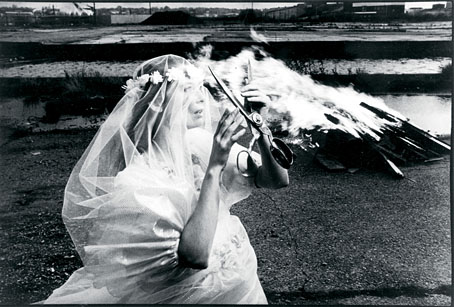Tilda Swinton in The Last of England (1988).
John Dee turned up in Derek Jarman’s Jubilee after scenes from an earlier script about the Elizabethan magus were grafted onto the punk dystopia. Jarman’s career was to be littered with these unrealised projects, the strangest of which was Neutron, an apocalyptic science fiction film he was planning following the comparative success of The Tempest in 1979. The description he gives in his “Queerlife”, Dancing Ledge, is as follows:
There are six published manuscripts of Neutron, which zig-zag their anti-heroes Aeon and Topaz across the horizon of a bleak and twilit post-nuclear landscape. ‘Artist’ and ‘activist’ in their respective former lives, they are caught up in the apocalypse, where the PA systems of Oblivion crackle with the revelations of John the Divine. Their duel is fought among the rusting technology and darkened catacombs of the Fallen civilization, until they reach the pink marble bunker of Him. The reel of time is looped—angels descend with flame-throwers and crazed religious sects prowl through the undergrowth. The Book of Revelations is worked as science fiction.
Lee [Drysdale] and I pored over every nuance of this film. We cast it with David Bowie and Steven Berkoff, set it in the huge junked-out power station at Nine Elms and in the wasteland around the Berlin Wall. Christopher Hobbs produced xeroxes of the pink marble halls of the bunker with their Speer lighting—that echo to ‘the muzak of the spheres’ which played even in the cannibal abattoirs, where the vampire orderlies sipped dark blood from crystal goblets.
If that doesn’t whet your appetite I don’t know what would. Later drafts of the script were written with Jon Savage. If the film had been made it might well have been terrible, of course, but Christopher Hobbs, who worked with Jarman on later films, as well as on Velvet Goldmine and the BBC’s Gormenghast, would at least have made it look great. David Bowie is very good in The Man Who Fell to Earth but his acting is seldom as successful elsewhere. Steven Berkoff would have been a better bet but a Bowie film would have received far more attention. Bowie discusses his involvement in a 1999 interview here (and also slags off Velvet Goldmine…booo!).
All this was happening circa 1980 when Reagan and Thatcher had just begun their insidious reigns and the Cold War was moving into a new era which generated a great deal of apocalyptic anxiety. Jarman’s response to all of this materialised in 1988 with The Last of England, his bleakest film, and a work in which we can perhaps see some of the nightmare scenes which Neutron would have conjured. I’ve never liked The Last of England very much but it contains a few sequences worth savouring, especially shots of the luminous Tilda Swinton dancing through the wasteland devastation. There’s a fragment of that here with her ripping her dress to pieces accompanied by the voice of Diamanda Galás. Meanwhile, does David Bowie still have the production designs for Neutron? If so, when do we get to see them?
Previously on { feuilleton }
• Mister Jarman, Mister Moore and Doctor Dee
• The Tempest illustrated
• In the Shadow of the Sun by Derek Jarman
• Derek Jarman at the Serpentine
• The Angelic Conversation
• The life and work of Derek Jarman


I think Mr. Bowie is bitter because, even though he wouldn’t let Velvet Goldmine use any of his music, the film was just as fabulous without it. That’s my theory, and I’m sticking with it!
(On a tangent even further removed from your post: I tended bar for Bowie and his entourage once, long ago, and of course I addressed him as Mr. Bowie. It was an odd experience but what was one to do?)
Hi John,
Is it just me or does Neutron sound very much like a Samuel R Delany plot – artists and activists, apocalyptic landscapes? Wonderful speculation… in a way it’s almost better not having any of the visuals because just having the description in words leaves the imagination free to visualise those angels with flamethrowers… wow!
CJ
Thom: I’ve always felt the film was better for Bowie being left out of it even though his career structures the thing. That way it’s much more of a fable, and it also allows more space for the related stuff such as Iggy, Eno & Roxy Music, T-Rex, etc.
Callum: Yes, it does sound very Delanyesque although I’ve never had any inkling that Jarman was influenced by Samuel D. Jon Savage may have been, however, since he’s a more literary type. A shame Savage never seems to have spoken about it.
John, I definitely agree with you. Whether Velvet Goldmine is seen as a fable or merely the director’s glam-rock wet dream is irrelevant, of course. It’s fabulous!